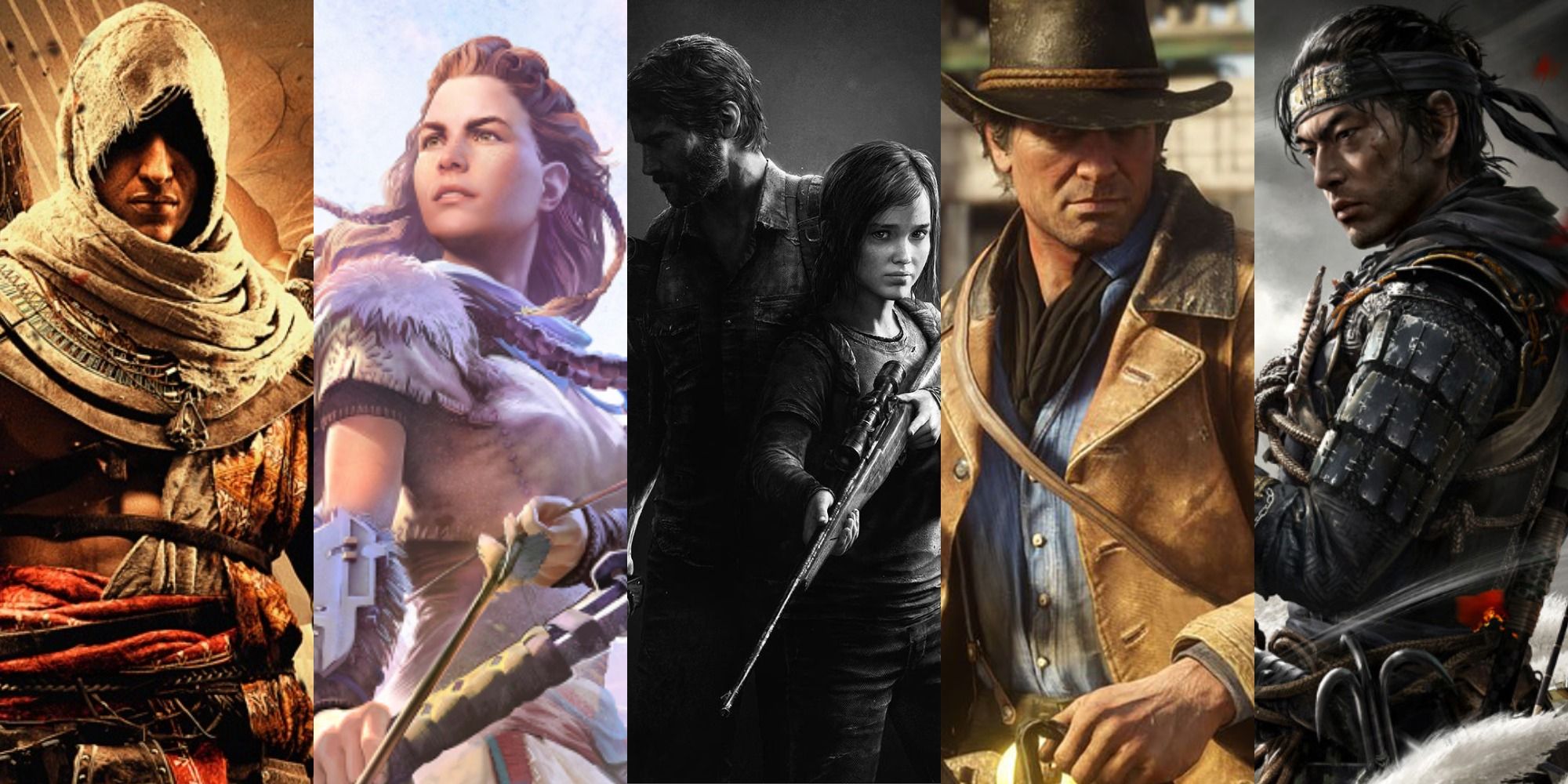
Beyond the Bang: The Enduring Power of Story-Driven Action Games
Action games, with their adrenaline-pumping combat, breathtaking set-pieces, and visceral thrills, have always held a prominent place in the gaming landscape. But while pure action titles offer instant gratification, it’s the story-driven action game that truly captivates, leaving a lasting impression long after the controller is put down. These games expertly weave compelling narratives, memorable characters, and thought-provoking themes into the heart of the action, creating experiences that are both exhilarating and emotionally resonant.
From the early days of pixelated adventures to the modern era of cinematic masterpieces, story-driven action games have continuously evolved, pushing the boundaries of interactive storytelling and blurring the lines between gameplay and narrative. But what exactly defines a story-driven action game, and why are they so compelling?
Defining the Genre: More Than Just Shooting and Slicing
At its core, a story-driven action game prioritizes narrative above all else. While satisfying combat and engaging gameplay mechanics are crucial, they serve as vehicles for delivering a richer, more meaningful experience. These games typically feature:
- A compelling plot: The narrative takes center stage, with a well-defined beginning, middle, and end. The plot often explores complex themes such as morality, sacrifice, revenge, and redemption.
- Memorable characters: Players connect with the characters, both protagonists and antagonists, through their motivations, relationships, and personal struggles.
- Meaningful choices: Player agency is often integrated into the narrative, allowing players to shape the story through their decisions, leading to multiple endings or branching storylines.
- Rich world-building: The game world is meticulously crafted, with its own history, lore, and culture, adding depth and immersion to the experience.
- Emotional resonance: The story evokes strong emotions in the player, whether it’s joy, sadness, anger, or hope, creating a lasting connection to the game.
Unlike purely action-focused games, where the story might be a thin justification for the gameplay, story-driven action games integrate narrative seamlessly into every aspect of the experience. The combat, exploration, and even the puzzle-solving are all tied to the overarching narrative, making the player feel like an active participant in the unfolding story.
A Legacy of Legends: Tracing the Evolution of the Genre
The roots of story-driven action games can be traced back to early adventure games that prioritized narrative and exploration. Titles like Prince of Persia (1989) introduced a cinematic flair to platforming action, while Flashback (1992) combined intricate storytelling with challenging puzzles and fluid animation. These games laid the groundwork for future titles that would seamlessly blend action and narrative.
The 3D era brought about a revolution in game development, and story-driven action games were at the forefront. The Legend of Zelda: Ocarina of Time (1998) set a new standard for world-building and character development, while Metal Gear Solid (1998) introduced a complex and politically charged narrative with groundbreaking cinematic cutscenes.
The 2000s saw a surge in popularity for open-world action games, with titles like Grand Theft Auto III (2001) offering vast environments to explore and compelling stories to uncover. Max Payne (2001) popularized the bullet-time mechanic and featured a gritty noir narrative, while Star Wars: Knights of the Old Republic (2003) allowed players to shape their own destiny in the Star Wars universe through meaningful choices.
The late 2000s and early 2010s saw the emergence of several critically acclaimed story-driven action games that pushed the boundaries of interactive storytelling. BioShock (2007) presented a thought-provoking exploration of objectivism and free will within a stunning underwater city. Uncharted 2: Among Thieves (2009) raised the bar for cinematic action and character development. Batman: Arkham Asylum (2009) delivered a compelling superhero narrative with intricate combat and stealth mechanics. Mass Effect 2 (2010) offered a vast and branching narrative with a memorable cast of characters.
More recently, games like The Last of Us (2013) and God of War (2018) have redefined the genre, demonstrating the power of emotional storytelling and nuanced character development within the context of action-packed gameplay. Sekiro: Shadows Die Twice (2019) expertly wove a compelling revenge story into its challenging and rewarding combat system. Ghost of Tsushima (2020) delivered a visually stunning and emotionally resonant samurai epic.
Why We Love Them: The Enduring Appeal of Story-Driven Action
The enduring appeal of story-driven action games lies in their ability to provide a uniquely immersive and engaging experience. They offer more than just mindless entertainment; they offer a chance to connect with characters, explore complex themes, and shape the outcome of the story.
Here are some key reasons why story-driven action games continue to resonate with players:
- Emotional Investment: The strong narratives and relatable characters allow players to become emotionally invested in the game world and its inhabitants. This emotional connection makes the victories feel more meaningful and the losses more devastating.
- Meaningful Choices: The ability to make choices that impact the story gives players a sense of agency and control. This agency makes the experience feel more personal and impactful.
- World-Building and Lore: The rich world-building and lore create a sense of immersion and believability. Players can lose themselves in these meticulously crafted worlds, exploring their history, culture, and secrets.
- Character Development: Witnessing the growth and evolution of characters throughout the story is a rewarding experience. Players connect with characters on a deeper level as they understand their motivations, flaws, and triumphs.
- Exploration of Themes: Story-driven action games often explore complex themes that resonate with players on a personal level. These themes can spark conversations and encourage reflection on real-world issues.
The Future of Story-Driven Action Games: What Lies Ahead
The future of story-driven action games looks bright, with developers continuously pushing the boundaries of technology and storytelling. We can expect to see:
- More sophisticated AI: Improved AI will allow for more realistic and dynamic character interactions, further enhancing the emotional impact of the story.
- Enhanced Facial Animation: More realistic facial animation will allow for more nuanced and expressive character performances, deepening the player’s connection to the characters.
- Branching Narratives: More complex branching narratives will allow for greater player agency and multiple playthroughs with significantly different outcomes.
- Emergent Storytelling: Emergent storytelling will allow for more dynamic and unpredictable events to unfold based on the player’s actions, creating truly unique and personalized experiences.
- Integration of VR and AR: The integration of VR and AR technologies will offer new levels of immersion and interactivity, blurring the lines between the game world and reality.
Conclusion: More Than Just a Game
Story-driven action games are more than just entertainment; they are interactive works of art that can transport us to other worlds, challenge our perspectives, and leave a lasting impact on our lives. By seamlessly blending thrilling action with compelling narratives, these games offer a unique and unforgettable experience that transcends the boundaries of traditional gaming. As technology continues to evolve and storytelling techniques continue to advance, the future of story-driven action games is sure to be filled with even more immersive, engaging, and emotionally resonant experiences. The bang is important, but it’s the story that truly makes these games sing. They offer a potent reminder that games can be powerful tools for storytelling, capable of evoking empathy, sparking imagination, and leaving a lasting mark on the player’s heart and mind.

